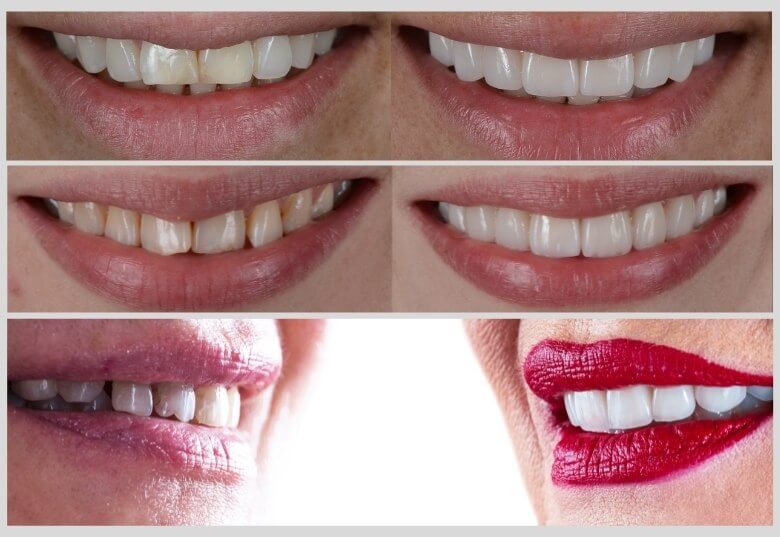Maybe you’ve never been that happy with the appearance of your teeth. You’ve always wanted to fix their appearance, but you’re not sure what options are available to you. If your teeth are stained, chipped, have gaps and other cosmetic problems, dental veneers may be the perfect dental product for your needs.
In this article, we’ll go over the complete guide about how to get your next veneers in 2022. You will learn about what dental veneers are, how they work, the treatment journey, who is the best candidate for veneers, cost of veneers, veneers FAQs, and how to book your next veneer appointment.
Table of Contents
What are dental Veneers?
Dental veneers are a thin cover placed over the front of the teeth to give the appearance of uniformity and traditional beauty. Dental veneers are cosmetic in nature – they do not serve an oral health function. Unlike braces and other orthodontic dental appliances, dental veneers do not move crooked teeth or correct problems like overbite. The purpose of dental veneers is to make your teeth beautiful, restore confidence in your smile, and cover up cosmetic problems that make you feel self-conscious.
Types of Veneers
There are two types of veneers: snap-on veneers and traditional veneers.
Snap-on veneers: are removable veneers that are molded to fit around the teeth and be removed at night for sleep. Snap-on veneers are budget-friendly, non-permanent dental appliances that can be worn when you want them, or taken off when you don’t. They are typically sold by the arch, so they cover all the teeth in the row. Although they don’t last as long as traditional veneers, snap-on veneers are far less costly and represent far less of a commitment for the consumer.
Traditional veneers: veneers are permanently affixed to the teeth. In order to prepare the teeth for traditional veneers, they must be ground down to make room for the veneers. Because the teeth are ground down, they must always be covered with veneers once the first set of veneers are in place. Dentists install traditional veneers over all teeth, or over teeth singly, depending on the needs of the patient. Traditional veneers can last for years. Replace traditional veneers as they become chipped.
Many brands manufacture veneers, including Advanced Dental Technologies, DuraThin, and DaVinci. Your dentist will help you find the right veneers for your needs.
Best Candidate for Veneers
A good candidate for veneers– whether traditional or snap-on- has teeth that are in good condition and has good oral hygiene practices. Your dentist can tell you whether you are a good candidate for veneers.
How long do veneers last?
How long veneers last depends on the type of veneers installed. Traditional veneers can last anywhere from five years to twenty, depending on the material, how well they’re maintained and other factors. Snap-on veneers can last for one or two years, depending on the material they’re made from and how well they’re maintained.
What material are Veneers made from?
Made from a hypoallergenic resin, snap-on veneers are easily molded to fit around the teeth. Traditional veneers can be made from porcelain or resin. Porcelain veneers are longer lasting, less likely to stain and less likely to become chipped. Resin veneers are a more affordable option, though they don’t usually last as long as porcelain veneers.
How can you maintain and clean Veneers?
Snap-on veneer users remove and clean them at least once per day, using a dentist-approved cleaning product, never with a sharp object or hard brush.
Removing your snap-on veneers at night and allowing them to air dry will prolong their life. Brush and floss your teeth at least twice per day, as you would without veneers.
Maintain traditional veneers much like your normal teeth. In other words, they need to be brushed twice per day. Take care to use non-abrasive toothpaste and a soft-bristle brush to keep your teeth clean. Using abrasive toothpaste or a hard toothbrush can scratch the surface of your traditional veneers, making them more susceptible to staining and potentially causing them to wear down.
Other tips for maintaining your veneers:
-
- Don’t chew on anything that isn’t food.
- Avoid chewing with your front teeth.
- Don’t use your teeth as scissors to open packaging.
- If you grind your teeth at night, tell your dentist.
How do you eat and sleep with Veneers?
Traditional veneers can tolerate a wider range of foods, although some hard foods could do damage to your veneers. Talk to your dentist to find out which foods are potentially most damaging to your dental veneers.
If you have traditional veneers, you can of course sleep with them in your mouth. If you have snap-on veneers, it’s best to take them off before going to sleep.
Pros of dental Veneers
- Look like natural teeth. Dental veneers are designed to look like your natural teeth, and to anyone else, should be indistinguishable from real teeth.
- Made from the mold of your teeth. All dental veneers, whether snap-on or traditional, are made from a mold of your teeth, so they can fit properly and comfortably.
- Restore confidence in your smile. You deserve to have a smile that you can be proud of. Dental veneers can restore confidence in your smile by covering stains and other cosmetic issues.
- Range of costs. While some dental veneers are quite costly, others (snap-on veneers) are very affordable. Talk to your dentist about ways that you can fit dental veneers into your budget.
Cons of dental Veneers
- Dental veneers serve no orthodontic function. Dental veneers are used in cosmetic dentistry only – they do not serve an orthodontic function. They cannot straighten your teeth.
Learn more about the pros and cons of veneers through this article.

Cost of Veneers
Veneers range in cost depending on the type of veneers that you’d like to buy. Traditional veneers can cost as much as $2,500-$3,500 per tooth, whereas snap-on veneers are paid for by the arch, which may be as little as $500 or as much as $2,500. Visit this article to learn more about how much veneers cost.
Fortunately, membership and discount plans are available ranging from $199-$299 annually. These plans can help reduce a portion of the cost for receiving veneers. Some types of insurance can also help pay for the cost of veneers. Ask your dentists about these options.
Don’t forget that veneers can only be used successfully if you have healthy teeth and overall good oral hygiene habits. Work with your dentist to ensure that your teeth are ready for veneers.
Veneer Treatment Journey
Step 1: Visit your dentist and determine whether you are a good candidate for dental veneers. Once dentist provides a diagnosis and determines that you are a good candidate, it’s time to clean your teeth and schedule an appointment to make a mold.
Step 2: Your dentist prepares your teeth to fit the veneers and makes a mold of your teeth. Then, the veneers are created from the mold.
Step 3: After shaping in preparation for dental veneers, then your dentist may attach temporary veneers to your teeth, until the permanent veneers are properly installed.
Step 4: You’ll return to the office to fit the permanent veneers or try the snap-on veneers.
Return to the office to fit the permanent veneers or try the snap-on veneers.
FAQ about Dental Veneers
Are Veneers safe?
Dental veneers are safe. Snap-on dental veneers require no changes to be made to your teeth. Traditional dental veneers do require your teeth to be reshaped for the installation of the veneer. Once the anesthetic wears off, you should be able to chew and use your teeth like normal.
Are Veneers permanent?
Snap-on dental veneers are not permanent, so if you’re interested in trying dental veneers without fully committing to a permanent dental procedure, snap-on veneers may be for you. Traditional dental veneers are permanent. Once a traditional dental veneer has been installed on your tooth, it should always have a dental veneer on it.
How much do Veneers cost?
Dental veneers can cost anywhere from $2,500 per tooth down to $500 per arch. The cost depends on the type of veneer you’re installing, the condition of your teeth, and other factors. Talk to your dentist to get a quote.
Which is better for me: Snap-On Veneers or traditional Veneers?
This is a question that you’ll have to answer in partnership with your dentist. This depends partly on your needs as well as your budget and other factors.
Will my insurance cover the cost of Veneers?
This depends on the type of insurance that you have. Consult with your insurance policy or contact your insurance agency directly to learn more.
Do Veneers look natural?
Veneers are virtually indistinguishable from natural teeth.
Ready for Your Next Veneers in Houston? Schedule Your An Next Appointment Today
Are you interested in getting dental veneers for your teeth? Schedule a consultation visit with us today to learn about options and pricing. Then work with the treatment coordinator to create your treatment plan, determine your costs, and discuss the best financing options for you. Once you find a cosmetic dentist in Houston who offers veneer services to clients, you’ll start the process.
In the world of cosmetic dentistry, veneers play an important role. They are a beautiful addition to your teeth. Install veneers to restore confidence in your smile today.
Schedule your next appointment at our site.

